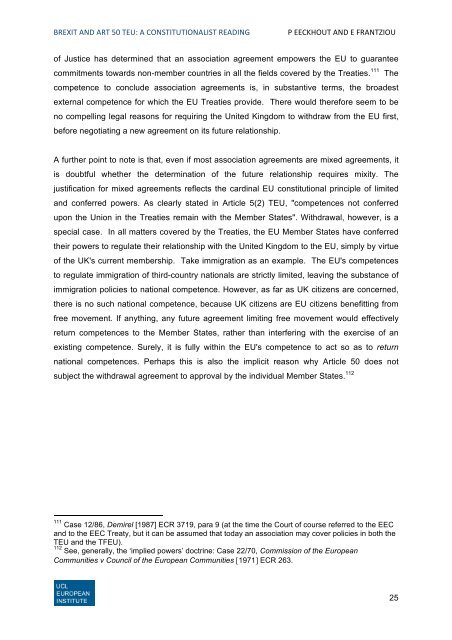brexit-article-50
brexit-article-50
brexit-article-50
You also want an ePaper? Increase the reach of your titles
YUMPU automatically turns print PDFs into web optimized ePapers that Google loves.
BREXIT'AND'ART'<strong>50</strong>'TEU:'A'CONSTITUTIONALIST'READING''''''''''''''''''''P'EECKHOUT'AND'E'FRANTZIOU'<br />
of Justice has determined that an association agreement empowers the EU to guarantee<br />
commitments towards non-member countries in all the fields covered by the Treaties. 111 The<br />
competence to conclude association agreements is, in substantive terms, the broadest<br />
external competence for which the EU Treaties provide. There would therefore seem to be<br />
no compelling legal reasons for requiring the United Kingdom to withdraw from the EU first,<br />
before negotiating a new agreement on its future relationship.<br />
A further point to note is that, even if most association agreements are mixed agreements, it<br />
is doubtful whether the determination of the future relationship requires mixity. The<br />
justification for mixed agreements reflects the cardinal EU constitutional principle of limited<br />
and conferred powers. As clearly stated in Article 5(2) TEU, "competences not conferred<br />
upon the Union in the Treaties remain with the Member States". Withdrawal, however, is a<br />
special case. In all matters covered by the Treaties, the EU Member States have conferred<br />
their powers to regulate their relationship with the United Kingdom to the EU, simply by virtue<br />
of the UK's current membership. Take immigration as an example. The EU's competences<br />
to regulate immigration of third-country nationals are strictly limited, leaving the substance of<br />
immigration policies to national competence. However, as far as UK citizens are concerned,<br />
there is no such national competence, because UK citizens are EU citizens benefitting from<br />
free movement. If anything, any future agreement limiting free movement would effectively<br />
return competences to the Member States, rather than interfering with the exercise of an<br />
existing competence. Surely, it is fully within the EU's competence to act so as to return<br />
national competences. Perhaps this is also the implicit reason why Article <strong>50</strong> does not<br />
subject the withdrawal agreement to approval by the individual Member States. 112<br />
111 Case 12/86, Demirel [1987] ECR 3719, para 9 (at the time the Court of course referred to the EEC<br />
and to the EEC Treaty, but it can be assumed that today an association may cover policies in both the<br />
TEU and the TFEU).<br />
112 See, generally, the ‘implied powers’ doctrine: Case 22/70, Commission of the European<br />
Communities v Council of the European Communities [1971] ECR 263.<br />
25


